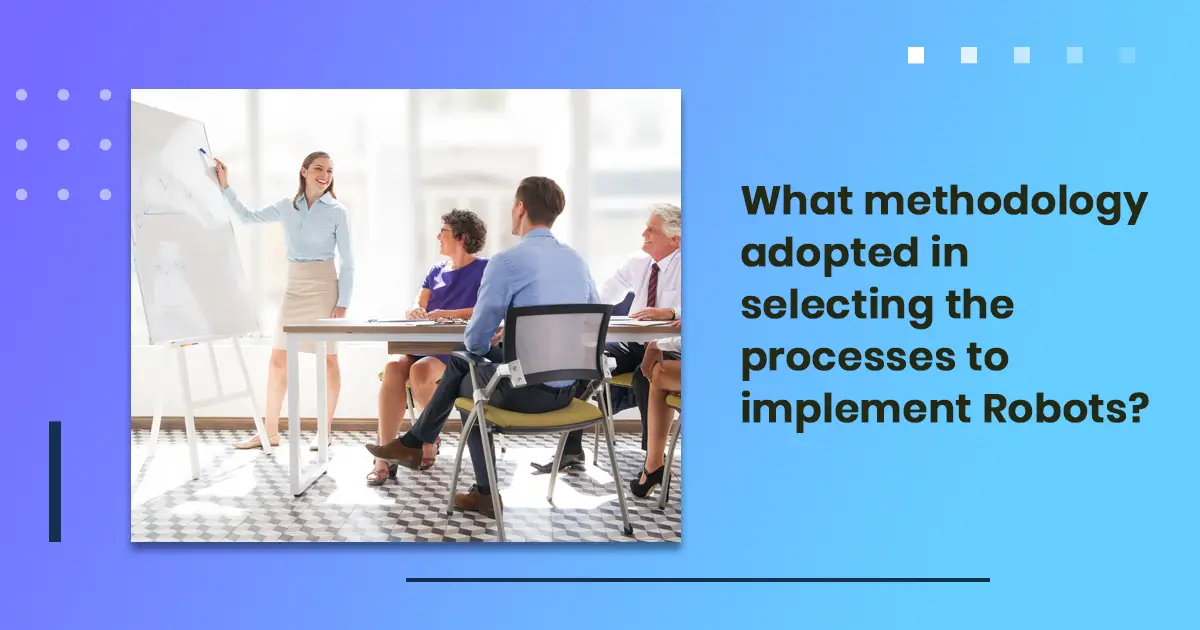
What methodology adopted in selecting the processes to implement Robots
Dec 29, 2023
RPA (Robots) are already making inroads to all sections and sizes of the business enterprises. Many business journals have forecasted the increasing growth percentage of this technology. This brings a healthy opportunity and induces firms to start implementing RPA as their digital team member.
Though deploying RPA is a simple task, in order for it to be a successful venture it needs some ground preparation and pilot study. The best approach is to start on small processes that are repetitive and routine. Once it is identified, tested and deployed then it gradually can be extended.
It is usually preferred to start with back-office jobs where there is low value, data entry tasks requiring low skill sets but are time consuming. Let us now understand what methodology is chosen for selecting the processes for implementing RPA.
Also Read: What is the right approach for RPA adoption - top-down or bottom-up approach
Initial stage:
- Select processes having standard guidelines:
RPA does not wear a thinking hat to interpret the data and make its own judgement. It needs clear and defined guidelines to work and to produce accurate results. The bots are designed to execute with structured input in order to deliver a predictive and invariable output.
Therefore, select those tasks where its elements are simpler, constant and repetitive. If the process gets complicated, then implementing becomes an expensive and a time-consuming affair. - Select processes that can quantify savings:
It is encouraged to start RPA only with those processes which can be measured against a given indicator. It can be either “time consumed” or “cost incurred” for the work cycle. The results can be observed when the staff are relieved from this task. The output is reflected through faster delivery, enhanced output, minimized human-hours and impeccable quality. -
Select processes that are recurring and manual:
Humans primarily get bored doing monotonous tasks which are cyclical and laborious. They tend to make errors and take more time and effort to rectify those errors. On the contrary, a robot's favorite hobby is doing work which is structured and repetitive. Within a very short time, it starts delivering favorable results. This enables any firm to show quick ROI. -
Select processes that has structured data:
Robots perform the best when dealing with structured formats like excel files etc. If the input is semi or unstructured data, the assurance of the results cannot be guaranteed. It is better to start with structured data to get quicker ROI. -
Select processes that are established and consistent:
RPA functions on a linear path, therefore, even a small change can disrupt its efficiency and need to tune its pathway. Therefore, during this stage it is advocated to select the processes that have been established for a longer period. Due to the stability of the processes, even the operational costs do not vary. Therefore, you will be in a position to establish the benefit of RPA and calculate ROI much easier.
Middle stage:
- Select processes having large transaction quantity and high rate of
recurrence:
Processes having a greater amount of transactions recorded and also recurring need to be postponed for the middle stage of automation. These transactions run regularly either on a day to day, weekly or monthly basis generating reports and other data. It is preferred to defer them to the second stage.
Standard Protocols to follow:
- Select processes having management and divisional approval:
It is necessary to reach a basic consensus between management and all the departments where automation is done. There are likely differences of opinions among departments, and the steps to be done need to be agreed upon prior. Since, robots inherently work on a predefined route, it becomes necessary to standardize the process we aim to automate. -
Select processes which are well documented:
Before starting with any process to automate, a well-documented process step should be at hand. Even an elementary level of documentation is compulsory as part of the process journey. After that the documentation can be structured into a template for future reference. It can take the form of flowchart, user guides, standard operating procedures etc.
Finally, decide on the best RPA automation service provider who can help you reach your desired targets. If you are interested in implementing finance and accounting solutions in your firm, we have extensive experience in this field.
Our accounting automation solutions will help you attain your efficiency and cost saving goals. Please contact us for a free consultation and demo.
Schedule Your Free Demo
With our accounting automation experts
Find out how other practices have benefited using Integra Balance AI bookkeeping automation. 87% of practices who viewed AI bots in action have instantly discovered the advantages of using them at their firm.
Global Offices
US (Head Quarters)
Integra Global Solutions Corp
7500 Brooktree Road, Suite 100
Wexford (Pittsburgh)
PA 15090
+1 412 267 1529
Philippines
Integra Global Solutions Corp
Ayala Cebu Tower,
Cebu Business park, Cebu 6000
+1 412 267 1529
Europe
Integra Global Solutions UK Ltd
College House
17 King Edwards Road
Ruislip, London, UK, HA4 7AE
+44 (0)20 7993 2949
Canada
Integra Global Solutions Corp
32 Blencathra Hill, Unit 100, Markham
Ontario
+1 412 267 1529
India
Integra Global Solutions Corp
First floor, Kanapathy Towers,
Opp.BSNL exchange, Ganapathy,
Coimbatore – 641 006, India
+91 (0422) 437 9555
Australia
Integra Global Solutions Corp
+61 02 8005 1836
